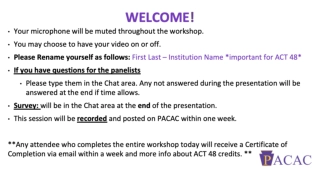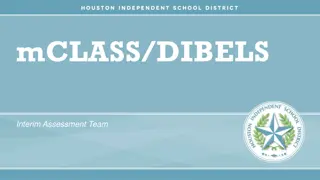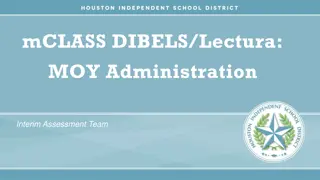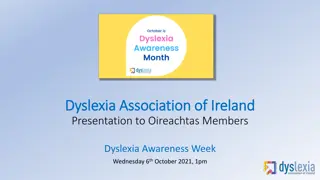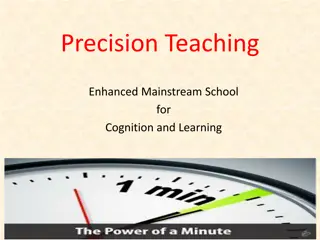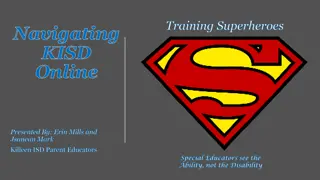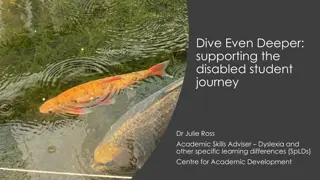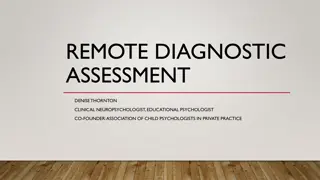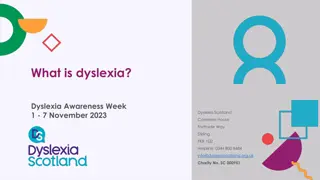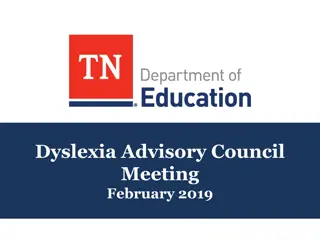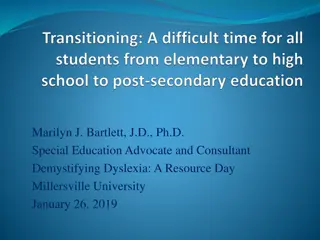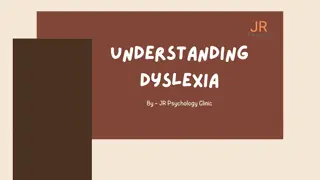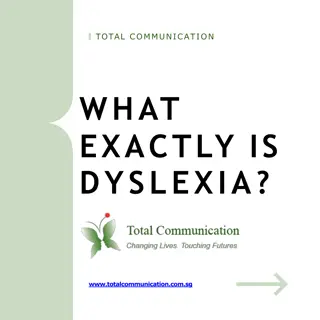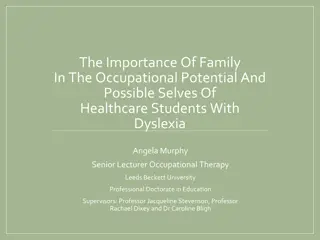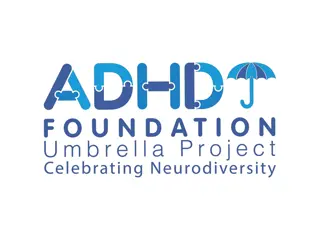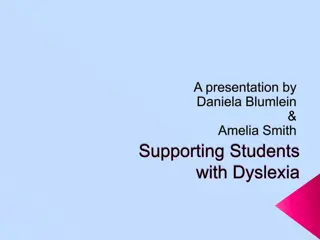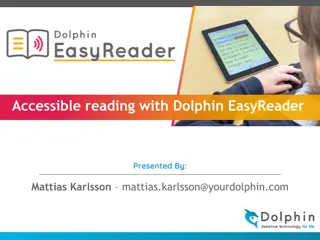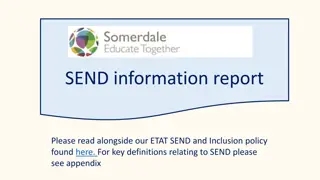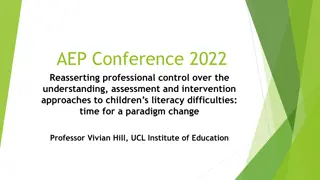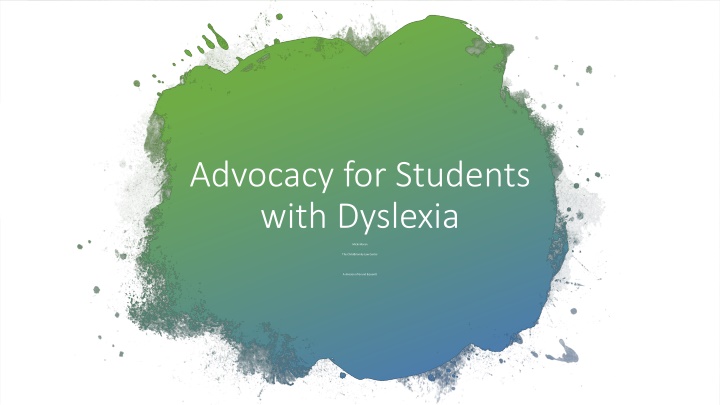
Dyslexia Advocacy and Legal Rights for Students
Discover the key aspects of dyslexia advocacy and legal rights for students, including the importance of proper evaluation and addressing educational needs. Learn about dyslexia under Illinois state law, the role of IDEA, and how to navigate school processes for students with dyslexia. Find out why schools may resist using the term "dyslexia" and what steps parents can take to ensure their child's needs are met. OSERS' guidance on specific learning disabilities is also highlighted.
Download Presentation

Please find below an Image/Link to download the presentation.
The content on the website is provided AS IS for your information and personal use only. It may not be sold, licensed, or shared on other websites without obtaining consent from the author. If you encounter any issues during the download, it is possible that the publisher has removed the file from their server.
You are allowed to download the files provided on this website for personal or commercial use, subject to the condition that they are used lawfully. All files are the property of their respective owners.
The content on the website is provided AS IS for your information and personal use only. It may not be sold, licensed, or shared on other websites without obtaining consent from the author.
E N D
Presentation Transcript
Advocacy for Students with Dyslexia Micki Moran The Child&Family Law Center A division of Grund &Leavitt
Legal Disclaimer This webinar is not intended to serve as legal advice. COVID-19: Federal law has not changed as a result of the pandemic. Remote learning is not working well for many students and it is likely that students may need additional services or compensatory education once schools resume. This is beyond the scope of this webinar and will be the subject of an upcoming webinar in January of 2021.
IDEA and Illinois State Law Dyslexia is one of the specific learning disabilities. Dyslexia is defined by Illinois state law as a Specific learning disability that is neurobiological in origin. Dyslexia is characterized by difficulties with accurate and or fluent word recognition and by poor spelling and decoding abilities. These difficulties typically result from a deficit in the phonological component of language that is often unexpected in relation to other cognitive abilities and the provision of effective classroom instruction. Secondary consequences may include problems in reading comprehension and reduced reading experience that can impede growth of vocabulary and backround knowledge.
The key to identifying dyslexia is a comprehensive evaluation by a qualified professional. There is not one measure alone that will diagnose a child with a dyslexia. If you are concerned about your child s progress it is essential that you address this with the school. Put your concerns in writing. If the district refuses to evaluate you may decide to pursue the evaluation privately. This can be a very good investment. Early identification and Evaluations
Schools often refuse to use the word dyslexia. The federal Office of Special Education and Rehabilitative Services (OSERS) release guidance to state and local educational agencies which clarifies that students with specific learning disabilities such as dyslexia, dyscalculia, and dysgraphia have unique educational needs and that there is nothing in the IDEA that would prohibit the use of the term dyslexia, dyscalculia or dysgraphia in a student s evaluation, determination of eligibility for special education and related services, in developing a student s IEP. * What s in a name Caveat: A dyslexia diagnosis alone doesn t qualify a student for special education services.
OSERS Reminds states of the importance of addressing the unique educational needs of children with specific learning disabilities resulting from dyslexia, dyscalculia, and dysgraphia during IEP meetings. guidance on dyslexia
ESSA and Dyslexia The Every Student Succeeds Act, referred to ESSA, is a federal law that went into effect in December of 2015 and directly addresses dyslexia. ESSA places a focus on literacy through new programs. It created the National Center on Improving Literacy. (https://improvingliteracy.org/)
Eligibility Requires: 1.Physical or mental impairment-listing specific learning disabilities as one of the examples. 2. Substantially limiting determined without mitigating measures, such as assistive technology, learned behavioral of adaptive neurological modifications, and reasonable accommodations or auxiliary aids/services. 3. A major life activity-listing reading among the examples as a result of the ADAA.
The purpose of special education under the IDEA It is the school district s responsibility to ensure that all children with disabilities have available to them a free, appropriate, public education (FAPE) that emphasizes special education and related services designed to meet their unique needs and prepare them for further education, employment, and independent living.
Myths Your child doesn t have to be two years behind to receive interventions. They have to fail first. Schools don t diagnose dyslexia.
Research based interventions a statement of the special education and related services and supplementary aids and services, based on peer-reviewed research to the extent practicable, to be provided to the child, or on behalf of the child, and a statement of the program modifications or supports for school personnel that will be provided for the child . . .
Instruction Explicit Systematic Comprehensive Systematic
Cases are hard to win on this issue alone- (Wilson, Orton-Gillingham). However, schools must be able to articulate what methodology they are using and why it is appropriate. In cases where parents prevail the following factors ( at least one ) are present: Methodology Procedural Violation ( lack of notice, denial of parent input or participation, failure to evaluate in all areas of suspected disability) Substantive ( the IEP was not appropriate, failure to individualize, lack of specific instruction, goals not met, lack of progress). School s inability to describe interventions and their appropriateness for this student.
IEP meetings Develop an Agenda before the meeting ( at least 3-5 days before the meeting). Develop Circulate it to the appropriate person ( case manager, special education director). Circulate Agree on Agree on a time frame for the meeting.
IEP meetings What does your child need? What is working? What isn t working?
General concerns Lack of understanding at IEP meetings regarding dyslexia and correspondingly the teaching of reading. Goals should be tied to educational needs.( phonological processing, spelling, writing, fluency). Accurate and quantifiable Present Levels of Performance are the starting point. Data driven. IEP goals
IEP Goals Measurable Data Driven Include who is responsible for taking data For each area of need there should be a goal. For example, if fluency is a need, there should be a stand- alone fluency goal. If there is a spelling goal that should be a separate goal. In short, every need cannot be addressed in one goal.
Goals are the cornerstone of every IEP Ask for draft goals in advance of the meeting. Schools should provide any reports or documents in advance of the meeting. If you have concerns about the goals put those concerns in writing. Ask why the goals are appropriate for your child.
Free, Appropriate, Public Education Progress must be more than minimal. Goals must be appropriately ambitious in light of the student s unique circumstances. Best isn t the standard. Appropriate.
Accommodations for students with dyslexia
Stay informed Educate yourself regarding dyslexia. Insist on data for every goal. If you have concerns request an IEP meeting.
Advocacy 1 2 3 4 Put all communications/concerns in writing. Be specific about your concerns. Use bullet points. Document any issues.
Selected Resources ISBE Division of Special Education Services The Dyslexia Guide: A Handbook for Parents, Educators, and Students. ( July, 2019) International Dyslexic Association www.dyslexiaiada.org Decoding Dyslexia Illinois www.dyslexiaial.org Everyone Reading Illinois.www.everyonereadingillinois.org Dyslexia Training Institute www.dyslexiatraininginstitute.org Learning Ally www.learningally.org The Yale Center for Dyslexia and Creativity www.dyslexia.yale.edu.
Follow up IEP REVIEW ATTEND IEP MEETINGS MEDIATION DUE PROCESS ( LAST RESORT)
Contact Information Micki Moran mmoran@grundlaw.com (312)-640-0500

